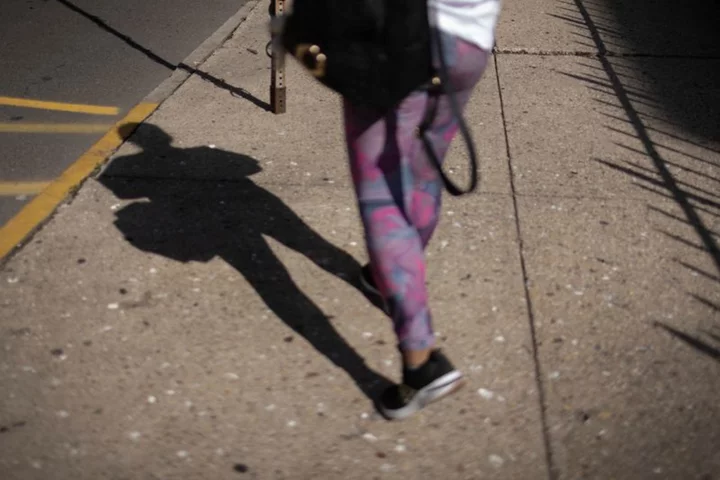By Laura Gottesdiener, Ted Hesson, Mica Rosenberg and Daina Beth Solomon
REYNOSA, Mexico Sept 29 When Carolina's captors arrived at dawn to pull her out of the stash house in the Mexican border city of Reynosa in late May, she thought they were going to force her to call her family in Venezuela again to beg them to pay $2,000 ransom.
Instead, one of the men shoved her onto a broken-down bus parked outside and raped her, she told Reuters. "It's the saddest, most horrible thing that can happen to a person," Carolina said.
A migrant advocate who assisted Carolina after the kidnapping, who spoke to Reuters on condition of anonymity due to security concerns, confirmed all the details of her account.
The attack came amid an increase in sexual violence against migrants in the border cities of Reynosa and Matamoros, both major transit routes for immigrants seeking to enter the U.S., according to data from the Mexican government and humanitarian groups, as well as interviews with eight sexual assault survivors and more than a dozen local aid workers.
"The inhumane way smugglers abuse, extort, and perpetrate violence against migrants for profit is criminal and morally reprehensible," U.S. Department of Homeland Security (DHS) spokesperson Luis Miranda said in response to questions about the rise in reported rapes.
Criminal investigations into the rape of foreign nationals, excluding Americans, were the highest on record in the two cities this year, according to state data from 2014 to 2023 obtained by Reuters through freedom of information requests.
The U.S. State Department considers Tamaulipas, where the two cities are located, to be the most dangerous state along the U.S.-Mexico border.
'TORTURE PROCESS'
Facing record illegal border crossings, U.S. President Joe Biden's administration in May moved to a new system that required migrants to secure an appointment - via an app known as CBP One - to present themselves at a legal border crossing to enter the United States.
Nine experts, including lawyers, medical professionals, and aid workers, told Reuters the new system has had unintended consequences in the two cities, contributing to a spike in violence.
The high risk of kidnapping and sexual assault in Reynosa and Matamoros is one of the factors pushing migrants to cross illegally, four advocates said. Crossings border-wide surged in September.
Biden officials say the new CBP policy is more humane because it reduces the need for migrants to pay smugglers and criminal groups to ferry them across the border illegally.
The experts said many asylum seekers are no longer paying smugglers to get them across the border - instead traveling towards the frontier on their own, hoping to make an appointment on the app.
But criminal groups are still demanding these migrants pay to enter their territory, the experts said.
"Rape is part of the torture process to get the money," said Bertha Bermúdez Tapia, a sociologist at New Mexico State University researching the impacts of Biden's policy on migrants in Tamaulipas.
The Gulf Cartel and the Northeast Cartel are both active in the region and kidnap migrants for ransom, particularly those who arrive without smugglers' protection, according to security analysts. Reuters was unable to contact the two groups.
Some migrants are also spending more time in the dangerous region, waiting to secure an appointment on the app. Tens of thousands of people a day are competing for 1,450 slots, according to U.S. Customs and Border Protection (CBP).
A senior CBP official based in Washington said CBP was troubled by reports of migrants sexually assaulted in the two cities.
"It's absolutely something that we're concerned about," said the official, who requested anonymity as a condition of the interview.
U.S. authorities temporarily suspended CBP One appointments in June in another Tamaulipas border city, Nuevo Laredo, due to "extortion and kidnapping concerns," the official said.
However, Miranda, the DHS spokesperson, said the administration's policies made it unnecessary to wait at the border since migrants could book an appointment from other parts of Central and Northern Mexico.
More than 250,000 migrants have scheduled appointments on the CBP One app, and over 200,000 Cubans, Haitians, Nicaraguans and Venezuelans have entered the United States by air under a separate Biden humanitarian program, according to CBP statistics.
'TAKE HER'
Carolina said she arrived in Reynosa the night of May 26 on a commercial bus with her 13-year-old son. Men began trailing them as soon as they arrived at the bus station, she said.
"They said we couldn't be there without their permission," she said, speaking from Chicago.
The U.S. State Department warns that criminal groups in Tamaulipas target buses "often taking passengers and demanding ransom payments."
The men whisked Carolina away to a house where she said she and other migrants were raped.
She said she was freed after family members paid $3,100 in ransom. Reuters was unable to independently verify the payment. She did not report the attack to police, saying she saw no point.
An Ecuadoran woman said that while in captivity in Reynosa her kidnappers repeatedly allowed a drug dealer to rape her in exchange for his deliveries of a white powder, which she suspected was cocaine.
One night, she clutched her figurine of the Christ child, tiptoed past her sleeping captors, and escaped through the window. "I still have nightmares," she said, speaking from New Jersey in August.
Reuters is withholding the full names of the survivors at their request. To corroborate their accounts, Reuters reviewed medical and psychological reports; criminal complaints and legal declarations; financial records, photos and videos supplied by the survivors, attorneys and advocates.
The state attorney general's office has opened seven rape investigations of foreign women in the first half of 2023. Four were opened in June alone.
Only one of the eight survivors Reuters interviewed reported the attack to authorities: a Honduran woman who said she was raped inside a migrant camp in Matamoros in late May. No one has been arrested, authorities said.
Olivia Lemus, head of Tamaulipas' human rights commission, said official data represents a fraction of the cases. "Migrants are afraid to file reports," Lemus said. "The fact that there aren't more reports doesn't mean that this crime isn't occurring."
Mexico's national migration agency, Tamaulipas' security agency, and Mexico's foreign ministry did not answer questions about sexual violence against migrants.
Juan Rodriguez, head of the Tamaulipas migrant services agency, said the agency was "attentive" to the issue.
"Unfortunately, sometimes things happen. We can't deny it."
A Venezuelan migrant said he was kidnapped in May in Reynosa by a cartel while traveling to the border for his confirmed CBP One appointment. He couldn't raise the full $800 ransom, so he was forced to work for two months to pay off the remaining $200, he said.
Two other migrants who said they were held at the house during the same time period confirmed the man was forced to work against his will, and that they heard female migrants being raped.
On the nights the Venezuelan man was tasked with standing guard over the other migrants, he said he watched the cartel members ask the man in charge of the house for permission to rape the women of their choosing.
He said the answer was always the same: "Take her."
(Reporting by Laura Gottesdiener in Reynosa and Matamoros, Ted Hesson in Washington, Mica Rosenberg in New York City and Daina Beth Solomon in Mexico City. Additional reporting by Jackie Botts in Mexico City, Daniel Becerril in Reynosa and Matamoros, and Kristina Cooke in San Francisco. Editing by Mary Milliken and Suzanne Goldenberg)









